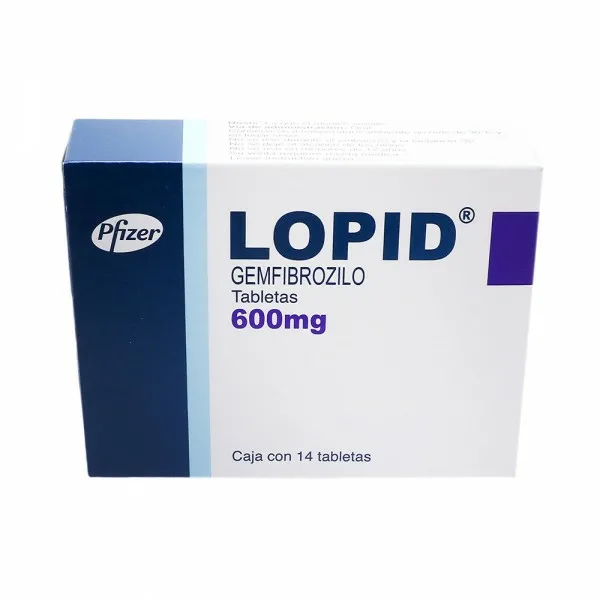Lopid (gemfibrozil) is a lipid-regulating medication primarily used to lower high levels of triglycerides and to increase HDL (“good”) cholesterol. It works by reducing the production of triglycerides in the liver and increasing the clearance of triglycerides from the bloodstream. Lopid is especially beneficial for patients with very high triglycerides who are at risk for pancreatitis or those with combined hyperlipidemia. It is often prescribed when diet and other lifestyle changes alone do not sufficiently reduce triglyceride levels. Lopid is taken twice daily, 30 minutes before breakfast and dinner. Regular monitoring of blood lipids and liver function is essential while on Lopid to ensure its effectiveness and to prevent potential side effects.


Effective Triglyceride Reduction
Lopid is highly effective in significantly lowering elevated triglyceride levels, which can help prevent pancreatitis, a serious condition linked to very high triglycerides. Its ability to target triglycerides specifically makes it an essential medication for patients with severe hypertriglyceridemia, offering a targeted approach that reduces the risk of related complications and supports overall heart health.

Increased HDL Cholesterol
In addition to lowering triglycerides, Lopid also helps increase HDL (“good”) cholesterol, which is beneficial for heart health. Higher levels of HDL cholesterol help protect against atherosclerosis and cardiovascular disease. By boosting HDL cholesterol while lowering triglycerides, Lopid offers a dual approach to managing lipid levels and reducing cardiovascular risk, making it a valuable option for comprehensive lipid management.

Prevents Pancreatitis
Lopid is crucial in preventing pancreatitis in patients with extremely high triglyceride levels. Pancreatitis is a painful and potentially life-threatening condition, and by significantly reducing triglycerides, Lopid helps lower the risk of its occurrence. For patients with a history of or susceptibility to pancreatitis, Lopid provides a protective measure that can prevent severe health issues, offering peace of mind and improved quality of life.
Lopid – Product Description
Overview:
Lopid (gemfibrozil) is a medication used primarily to treat high triglyceride levels and mixed dyslipidemia. It works by inhibiting the production of triglycerides in the liver and increasing the removal of triglycerides from the bloodstream. Additionally, Lopid helps raise HDL cholesterol, providing dual benefits in lipid management. It is particularly effective for patients with severe hypertriglyceridemia or those at risk of pancreatitis. Lopid is typically taken twice daily before meals, and regular monitoring of lipid levels and liver function is important to ensure safety and effectiveness. Lopid’s role in reducing triglycerides and increasing HDL cholesterol makes it a vital option for patients with specific lipid abnormalities.
Indications:
Lopid is indicated for the treatment of hypertriglyceridemia (high triglycerides) and mixed dyslipidemia. It is particularly prescribed for patients with very high triglycerides who are at risk of developing pancreatitis. Lopid is also used to help increase HDL cholesterol, which can reduce the risk of cardiovascular disease. Patients who do not respond adequately to diet, exercise, and other non-pharmacological interventions may benefit from Lopid’s lipid-modifying effects. It is suitable for adults with specific lipid disorders requiring targeted triglyceride reduction and HDL elevation.
How to Use:
Lopid is typically taken twice daily, 30 minutes before breakfast and dinner. It is important to follow the prescribed dosing schedule to achieve the best results. Patients should swallow the tablets whole with water and avoid crushing or chewing them. Regular follow-up appointments and blood tests are necessary to monitor the drug’s effects on lipid levels and liver function. Patients should adhere to any dietary recommendations provided by their healthcare provider, as a healthy diet enhances Lopid’s effectiveness. If a dose is missed, it should be taken as soon as remembered unless it is close to the next scheduled dose.
Advantages:
Lopid offers several advantages, particularly in its ability to significantly lower triglyceride levels, which can prevent serious conditions like pancreatitis. Additionally, Lopid helps increase HDL cholesterol, offering protection against cardiovascular disease. Its effectiveness in patients who do not respond to diet and exercise alone makes it a crucial option for lipid management. The dual action of lowering triglycerides and raising HDL cholesterol provides a comprehensive approach to improving lipid profiles and reducing cardiovascular risk.
Conclusion:
Lopid is a powerful medication for managing high triglyceride levels and mixed dyslipidemia. By lowering triglycerides and increasing HDL cholesterol, Lopid helps reduce the risk of pancreatitis and cardiovascular disease. It is particularly effective for patients with severe hypertriglyceridemia or those at risk of pancreatitis, offering targeted lipid management that can improve overall heart health. Regular monitoring and adherence to prescribed dosages are essential to maximizing the benefits of Lopid. Its dual action and proven efficacy make Lopid a vital tool in the management of complex lipid disorders.
Composition:
Lopid contains gemfibrozil as its active ingredient, which works by inhibiting the production of triglycerides in the liver and enhancing the clearance of triglycerides from the bloodstream. In addition to gemfibrozil, Lopid tablets may contain inactive ingredients such as calcium stearate, hydroxypropyl cellulose, and starch, which help stabilize the medication and ensure proper absorption. Lopid’s formulation is designed to effectively lower triglycerides and raise HDL cholesterol, offering a targeted approach to lipid management.
Note:
Patients taking Lopid should be aware of potential side effects, including gastrointestinal issues, liver function abnormalities, and muscle pain. Regular monitoring of liver function and lipid levels is essential. Lopid should not be used in combination with certain other cholesterol-lowering medications, such as statins, due to the increased risk of muscle-related side effects. Pregnant or breastfeeding women should avoid Lopid, as it may harm the fetus or infant. Patients should inform their healthcare provider about all medications and supplements they are taking, as Lopid can interact with other drugs. Maintaining a healthy diet and lifestyle is important while on Lopid to achieve the best outcomes.
Lopid: Effective Triglyceride Management for Heart and Pancreas Health
In this informative video, we explore Lopid.
Why us?

Authenticity Guaranteed:
We ensure that every batch of Capoten is sourced from trusted manufacturers, providing you with genuine medication that meets the highest quality standards.

Competitive Pricing:
Our pricing is designed to make essential medications like Capoten accessible to all, offering competitive rates and frequent discounts to help you manage your health affordably.




